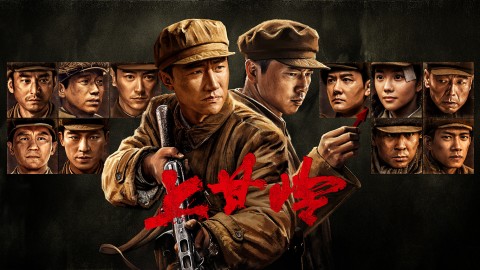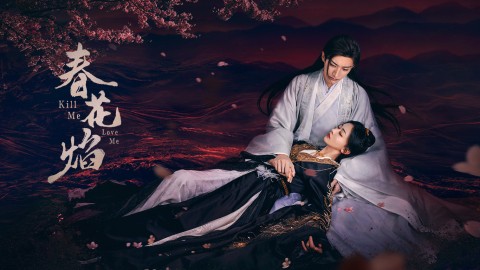Episode 17 recap: Mao Zedong came to Shanghai and became the Minister of Propaganda.
Jiang Jieshi and Zhang Jingjiang were having a conversation together, and Jiang Jieshi asked Zhang Jingjiang if he should keep some distance from the Communist Party. Zhang Jingjiang told him that there was no need and that it was fine to remain neutral, just like it is now. He told Jiang Jieshi that the reason Wang Jingwei tried to win him over was because he held military power and did not take sides. Zhang Jingjiang felt that Wang Jingwei was merely acting like a leader and that his position could be replaced.
Jiang Jieshi told him not to joke and that he only wanted to remember Sun Yat-sen's will. Zhang Jingjiang felt that the two of them should not pretend anymore and that he would help Jiang Jieshi with his operations in the central government.
Jiang Jieshi found Jiang Xianyun and told him that he was the exemplary revolutionary soldier he wanted to cultivate. Zhou Enlai was singing on stage when Chen Geng came to inform him that it was time. Zhou Enlai didn't even have time to remove his makeup and hurriedly went to meet Deng Yingchao.
When faced with their inquiries one by one, Chen Geng told them that Deng Yingchao was Zhou Enlai's fiancée and had come this time for their wedding. Governor Zhao received a letter from Cheng Xusheng, who said that if another Mao Zedong emerged in Hunan, he, as the governor, would not be able to maintain stability.
Guo Lubin received a letter from Governor Zhao, and his expression changed. Mao Zedong and Yang Kaihui were together playing with their children, Anqing. Mao Xinmei brought a message from Guo Lubin to urgently inform Mao Zedong to leave. He told him that Governor Zhao had sent people to arrest Mao Zedong and that it would be better for him to go as far away as possible.
Yang Kaihui quickly packed Mao Zedong's luggage and urged him to leave. Mao Zedong looked at his children, Anying and Anqing, sleeping on the bed, and he couldn't bear to part with them. After repeated urging from Yang Kaihui, Mao Zedong reluctantly left. He wished to gaze at his children a little longer, but time did not allow it.
Mao Zedong told Yang Kaihui that he didn't know when they would see each other again, and he didn't know if the two osmanthus trees at the night school entrance had bloomed. He asked Yang Kaihui to make a bottle of osmanthus wine for him when the osmanthus trees bloomed. Yang Kaihui asked why he wanted to make wine when he didn't like drinking.
Mao Zedong said that osmanthus wine lasts longer than osmanthus cake, and he could carry it with him. He could take it out and smell the osmanthus wine when he felt homesick. Wang Shulan's voice came from outside, urging Mao Zedong to leave quickly. Just as Mao Zedong left, the people who were after him arrived.
On his way out, Mao Zedong heard the news of the killing of party member Liao Zhongkai and stood frozen in place. Mao Zedong decided to stay at Li Da's house for the night for the time being. He knew he couldn't stay in Changsha anymore; he had to go to Guangzhou. Mao Zedong and Li Da discussed the power of the peasants. Mao Zedong told Li Da about his experience in Shaoshan, fighting against the landlords alongside the common people. He believed that the fundamental reason for China's past failures was the lack of unity.
After listening, Li Da said that no one had ever done this work before. Mao Zedong replied that since he currently had nothing to do, he would take on this task. Mao Zedong told Li Da that the future revolution in China ultimately relied on the proletariat. He believed that only when the working class succeeded could they confront imperialism.
Mao Zedong was deeply saddened by the fact that Liao Zhongkai could be killed right at his doorstep. He felt there was nothing they couldn't do, and his grief was overwhelming. Mao Zedong realized that there was a crucial question in front of him: which class would lead the Chinese revolution? Li Da told him that he couldn't answer that question, and even Chen Duxiu couldn't answer it. Even the late Mr. Sun Yat-sen couldn't answer it.
Mao Zedong passionately recited a poem by the side of the Dahua Lake in Hunan. He left Hunan and headed for Guangzhou. Jiang Jieshi believed that if they couldn't unify Guangdong, the British would become more active in their calculations. He thought the Eastern Expedition should be put on the agenda. He asked Zhou Enlai for his opinion, and Zhou Enlai told him that without the Eastern Expedition, there would be no Northern Expedition.
Mao Zedong met with Wang Jingwei. Wang Jingwei knew that Mao Zedong had faced many obstacles in Shanghai, and he remarked that Chen Duxiu had truly underestimated Mao Zedong's abilities. Wang Jingwei informed Mao Zedong that the Propaganda Department was currently short of personnel and he wanted Mao Zedong to join. Mao Zedong became the Minister of Propaganda.



Comments(Episode 17)